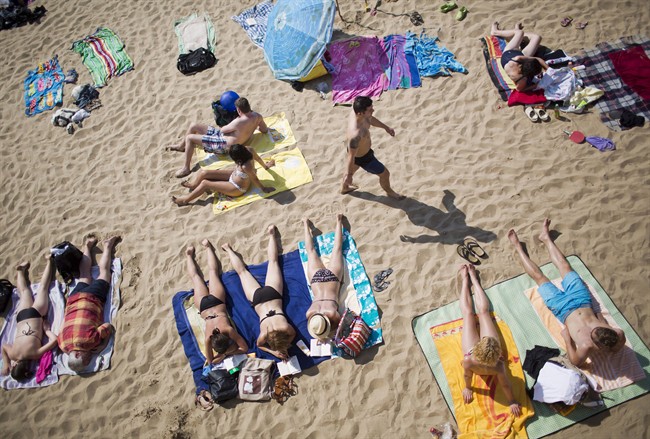Summer? Awesome. Sunshine? Awesome. Hours spent lounging on beaches, in parks, on patios? Extremely awesome.

Painful, red, blistered skin? Not awesome.
Sun exposure can cause more than moderate irritation: It can leave you with lifelong, potentially fatal damage.
According to the Canadian Cancer Society an estimated 6,500 Canadians will be diagnosed with melanoma this year. Of those 1,050 will die.
Other types of skin cancer include basal cell carcinoma and squamous cell carcinoma, although they are not as likely to cause fatalities.
Talk to your doctor for more information on detection and treatment.
Sunscreen is one of many things you can use to stay safe in the sun – if you remember to put it on, and do it right.
Here are some common misconceptions about sunscreen.
1. You only have to wear it when it’s sunny.
Ultraviolet A (UVA) rays cause wrinkles and other age-related changes, whereas Ultraviolet B (UVB) rays cause burning. These rays can penetrate through clouds, fog and haze. If you wear sunscreen that says “broad spectrum” on the bottle it will protect you from both UVA and UVB rays.
2. You’re protected as soon as you put it on.
You should apply sunscreen about 20 minutes before going outside. This gives your skin time to soak up the sunscreen. Re-applying out of the sun is also a good idea.
READ MORE: How to choose the best sunscreen
3. The higher the SPF the more protected you are.
SPF stands for Sun Protection Factor. But a higher SPF doesn’t necessarily mean you’ll be better protected. The number is an estimate of how long you will be protected for. There are some easy tricks to estimate the level of effectiveness on your skin tone, but ultimately you should follow the instructions on the back of the bottle.
4. Tan people don’t need sunscreen.
Although there are six different classifications of skin tone, each one is capable of getting skin cancer. Sunscreen can help protect your skin from harmful UVB rays.
5. Your sunscreen is water- or sweat-resistant.
Although sunscreen may claim to be water or sweat resistant it only lasts for 40-80 minutes. If you are in and out of the water you should reapply frequently. Make sure to dry off your skin before reapplying or the sunscreen may wash off.
READ MORE: Five sunscreen tips to avoid getting sunburned this summer
6. You can’t get burned after 4 o’clock.
The sun is at it’s highest between 11 a.m. and 4 p.m. but that doesn’t mean the sun can’t be damaging before or after these times. You should be aware of your local UV index. The UV index ranges from low to extreme and various methods of protection are required.

7. You can’t get burned through your clothing.
Although you’re not as likely to get burned when wearing light-coloured, loose-fitting clothing, you should look for tightly woven fabrics, which are more likely to block the sun’s rays. There are also UV protective materials.
8. Last year’s bottle is still okay.
Even sunscreen has an expiry date. Make sure to dispose of sunscreen that’s changed colour, consistency or has been exposed to high temperatures. Sunscreen shouldn’t last you more than a year because it needs to be applied generously.

READ MORE: Sunscreen Myths with Dr. Julia Carroll
9. Sunblock and sunscreen are the same.
Sunblock physically blocks the sun. Zinc Oxide (the stuff you see TV lifeguards wearing on their noses) is a sunblock. Sunscreen is a chemical method of reducing ultraviolet rays from penetrating the skin.
10. Sunscreen is enough.
Sunscreen may protect you from UVA and UVB rays but it is recommended that you reduce your time in the sun, wear wide brimmed hats, wear sunglasses with 100% UV protection, stay in the shade and drink lots of water to stay safe from other sun side effects, such as heatstroke.












Comments